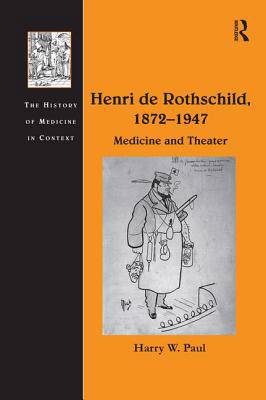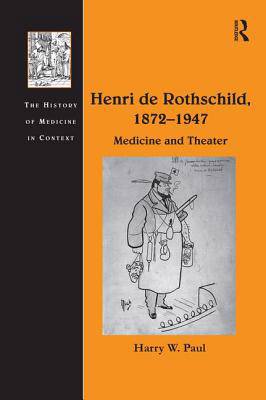
- Afhalen na 1 uur in een winkel met voorraad
- Gratis thuislevering in België vanaf € 30
- Ruim aanbod met 7 miljoen producten
- Afhalen na 1 uur in een winkel met voorraad
- Gratis thuislevering in België vanaf € 30
- Ruim aanbod met 7 miljoen producten
Zoeken
Omschrijving
Dr Henri de Rothschild was a fifth generation Rothschild and perhaps the most famous of the Paris Rothschilds of the fin-de-siècle period. A 'sleeping partner' of the bank and the non-drinking owner of Mouton-Rothschild, Henri spent much of his life building medical institutions and promoting scientific medicine, including the promotion of Ehrlich's Salvarsan to cure syphilis and the use of radium to cure cancer. His hospital in a working class area of northern Paris boasted the latest in medical advances. Henri was particularly influential in developing the new science of infant feeding, while his broader concerns with infant health led to his playing a prominent role in the development of the specialty of pediatrics. This biography of Henri de Rothschild focuses on his medical achievements and that of his close family in France. Henri, his wife Mathilde and his mother Thérèse all had busy medical careers during World War I. The book also gives an account of both women's experiences of the war. Along with his explicitly scientific medical concerns, Henri was also a prolific playwright and, under the pseudonym André Pascal, wrote several plays about doctors. This book situates the plays, and particularly the themes of charlatanism, women doctors and medical ethics, in their contemporary context of the social and medical life of Paris. A fascinating and vividly written study of a somewhat neglected figure in the history of the illustrious Rothschild family, this book will make a valuable addition to the libraries of scholars in the history of medicine and those studying child health and welfare, the portrayal of doctors in literature, and more broadly the social and cultural life of early-twentieth century Paris.
Specificaties
Betrokkenen
- Auteur(s):
- Uitgeverij:
Inhoud
- Aantal bladzijden:
- 322
- Taal:
- Engels
- Reeks:
Eigenschappen
- Productcode (EAN):
- 9781138272187
- Verschijningsdatum:
- 28/10/2016
- Uitvoering:
- Paperback
- Formaat:
- Trade paperback (VS)
- Afmetingen:
- 156 mm x 234 mm
- Gewicht:
- 453 g

Alleen bij Standaard Boekhandel
+ 228 punten op je klantenkaart van Standaard Boekhandel
Beoordelingen
We publiceren alleen reviews die voldoen aan de voorwaarden voor reviews. Bekijk onze voorwaarden voor reviews.








